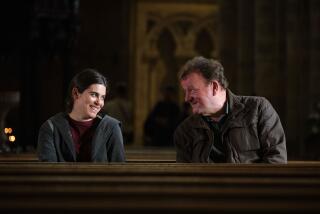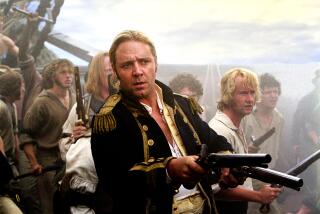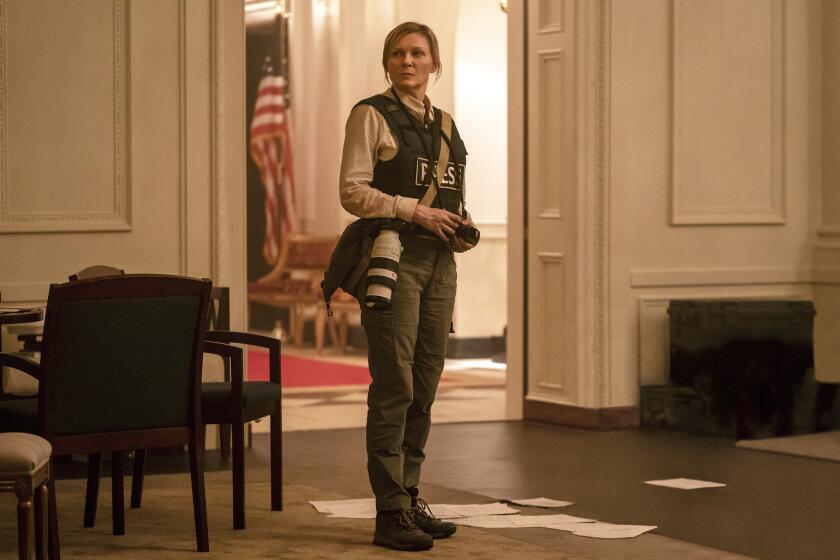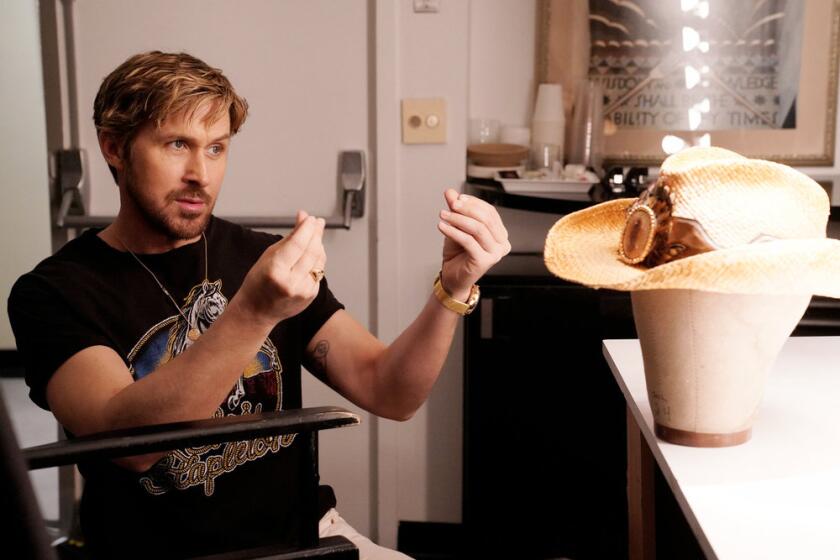Review: Gary Oldman’s bulldog performance as Winston Churchill lifts Joe Wright’s overwrought directing in ‘Darkest Hour’
From its grab-for-all-the-gusto Gary Oldman performance to its direction by Joe Wright, “Darkest Hour” is nothing if not an energetic, showy piece of work, but some types of showy have more staying power than others.
The lean and hungry Oldman would seem an unlikely pick to play the rotund, jowly Winston Churchill, even though he’s one of Britain’s top actors and has played all manner of historic figures from Sid Vicious to Lee Harvey Oswald.
But helped by the wizardly contribution of Oscar-nominated makeup artist Kazuhiro Tsuji, who worked for six months developing the look, Oldman’s brassy presentation goes well beyond a collection of mannerisms. It gives us a sense of a flesh and blood person behind the bulldog-fierce political leader who presided over his country’s celebrated World War II resistance.

Gary Oldman plays Winston Churchill as he becomes England’s prime minister in “Darkest Hour.”
Only those who knew Churchill can say whether Oldman’s fine performance is an accurate representation of what the British leader was like behind the scenes, but as a portrait of a wildly eccentric, believable human being, it succeeds beyond doubt.
As a director Wright is known for jazzing up such staid literary classics as “Pride and Prejudice” and “Anna Karenina” (both starring Keira Knightley); he certainly knows his way around a moving camera. Collaborating with cinematographer Bruno Delbonnel (“Amélie,” “Inside Llewyn Davis”), the crowd-pleasing filmmaker always sees heightening the on-screen drama as job one.
With visual preferences including overhead shots, elaborate tracking sequences, dramatic chiaroscuro lighting and more, Wright is ruthless about eliminating dull moments. But his high-energy style does not always wear especially well, leading to the feeling that the film is trying too hard and unnecessarily hyping what is an innately involving story.
The same could in theory be said about Oldman’s performance, but in fact the opposite proves to be true. The more we see of it, the more convincing it becomes, and as the actor rips into Churchill’s celebrated speeches, from “blood, toil, tears and sweat” to “we shall fight on the beaches,” we feel the drama intensify toward the evacuation at Dunkirk, France.
As written by Anthony McCarten, a biopic veteran (the Stephen Hawking-centered “The Theory of Everything”), “Darkest Hour” is the third film this year, after “Their Finest” and “Dunkirk,” to touch on that epic victory-snatched-from-defeat moment early in the war.
But though the evacuation is the climax of “Darkest Hour,” the film, set during the first May-June 1940 weeks of Churchill’s time as prime minister, is more about how he came of age in the job than the specifics of that battle.
We hear about Churchill before we see him, as Parliament grows vocally weary of the current PM, Neville Chamberlain, known for fruitlessly seeking “peace in our time.” Churchill, though no favorite of his own ruling Conservative party, is tapped to succeed him because he is the only candidate the opposition will support.
Among the dubious is King George VI (an uncharacteristically unmenacing Ben Mendelsohn), who comments, in one of McCarten’s many arch lines, “his record is a litany of catastrophe.”
Even the man himself is, at age 65, worried that he is too old for a job he’s wanted since childhood and fears that he’s only being offered it “because the ship is sinking. It’s revenge.”
Our introduction to this crotchety individual is through the eyes of a classic audience surrogate, an innocent young woman named Elizabeth Layton, who has no idea what she’s getting into. The Churchill she meets alternately mumbles and screams, demands that his newspaper be ironed, naps every day at 4, goes into an absolute fury if presented anything typed single-spaced, and is given to dictating from the bathtub.
It’s no surprise that Elizabeth flees from his presence almost immediately, but because she’s played by a recognizable star, “Downton Abbey’s” Lily James, we know she’ll be back. It’s that kind of film.
Making that return possible is the only person on the planet who is capable of keeping Churchill in line: his loyal wife Clementine or Clemmie, regally played by Kristin Scott Thomas.
“You’re on the brink of tremendous power, you must be more kind,” she tells him. Churchill tries, he really does, but part of the fun of Oldman’s performance are the moments when he loses it and screams things like “will you stop interrupting me when I am interrupting you.” When he says “my emotions are unbridled” he is not exaggerating.
Aside from the crisis of all those British soldiers trapped on the beach at Dunkirk, Churchill has to deal with his recalcitrant war cabinet, led by the austere Viscount Halifax (Tony-winner Stephen Dillane), which wants him to consider peace talks with the Germans rather than potentially fight to the last man.
Though “Darkest Hour” posits that Churchill was not without doubts, in the end he seems to be the only person in power who correctly understands the nature of the Nazi menace. For someone whose humble toast on taking the job was “here’s to not buggering it up,” he ended up just fine.
-------------
‘Darkest Hour’
Rating: PG-13 for some thematic material
Running time: 2 hours, 5 minutes
Playing: ArcLight, Hollywood; Landmark, West L.A.
See the most-read stories in Entertainment this hour »
Movie Trailers
More to Read
Only good movies
Get the Indie Focus newsletter, Mark Olsen's weekly guide to the world of cinema.
You may occasionally receive promotional content from the Los Angeles Times.







